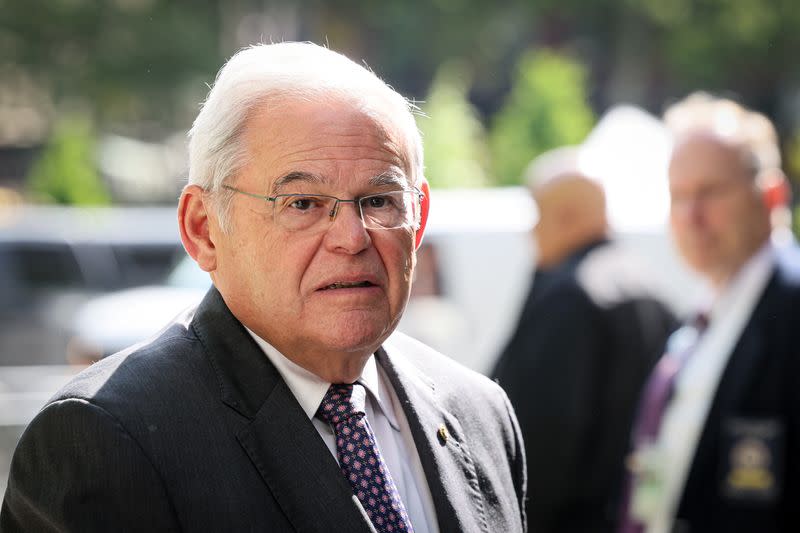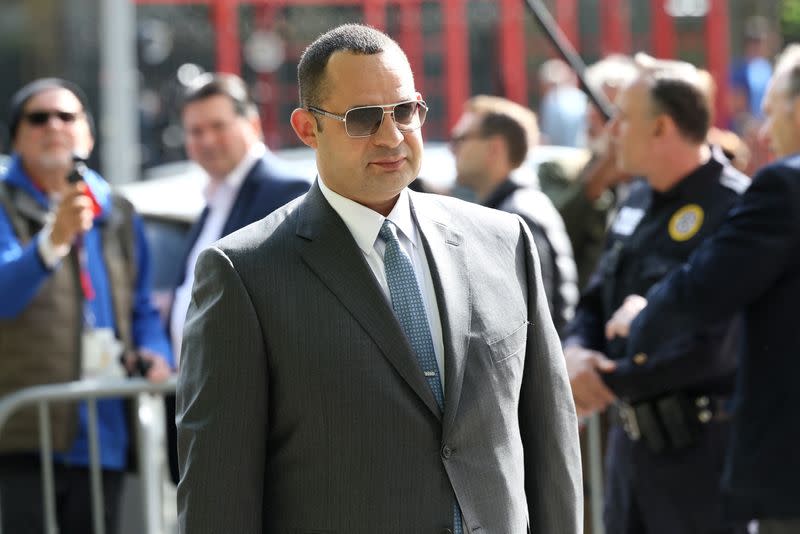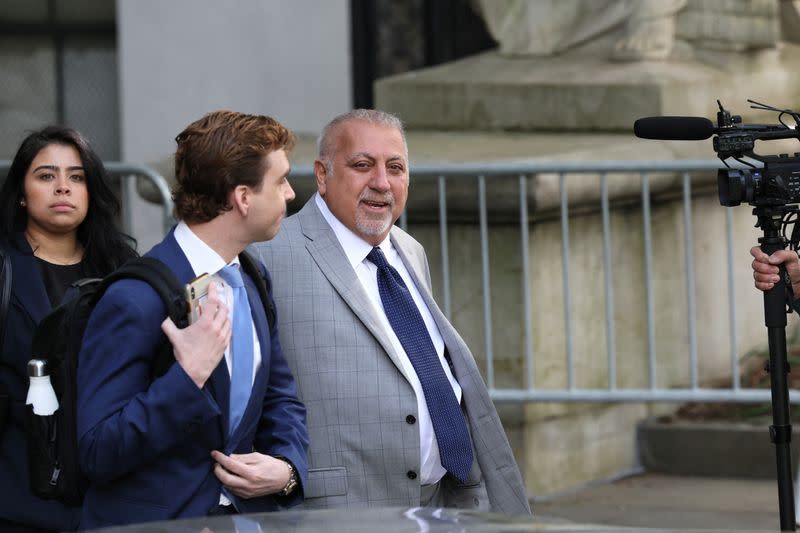US Senator Menendez's corruption trial on verge of getting jury
- Oops!Something went wrong.Please try again later.
By Jonathan Stempel
NEW YORK (Reuters) -A jury for U.S. Senator Robert Menendez's corruption trial could be seated as soon as Wednesday, to assess the Democrat's role in what federal prosecutors called a years-long bribery scheme to benefit foreign governments and himself.
In a second day of jury selection, U.S. District Judge Sidney Stein questioned 32 prospective jurors on Tuesday in his Manhattan courtroom.
They had said they could be could be impartial toward New Jersey's senior senator, who has pleaded not guilty to 16 criminal charges including bribery, fraud, acting as a foreign agent and obstruction.
Earlier, the judge dismissed at least 75 others from the jury pool for the trial, which he has said could last into July.
Though no jurors have been seated, Stein said a jury could be chosen on Wednesday morning, followed by opening statements.
"We are making progress," Stein said.
Prosecutors said Menendez, 70, and his wife Nadine accepted several hundred thousand dollars of cash, gold bars and a Mercedes-Benz convertible, in exchange for his providing political favors and aid to the governments of Egypt and Qatar.
New Jersey businessmen Wael Hana and Fred Daibes are being tried alongside the senator. They also pleaded not guilty.
Menendez was accused of promising to help Egypt obtain arms sales and other aid, helping Hana obtain a lucrative monopoly on certifying halal meat exports to Egypt, and trying to help Daibes obtain millions of dollars from a Qatari investment fund.
Prosecutors also accused the senator of trying to interfere in a federal criminal case against Daibes in New Jersey, and in state criminal cases involving two associates of Jose Uribe, an insurance broker.
Uribe pleaded guilty in March to bribery and fraud and agreed to cooperate with prosecutors.
Nadine Menendez, 57, who married the senator 3-1/2 years ago, has also been charged and pleaded not guilty.
She will be tried separately on July 8. Her lawyers have said she suffered a serious medical condition that required a long recovery.
Lawyers for Robert Menendez have suggested that if the senator testified, he may try to blame his wife, possibly for withholding information and making him believe his activities were lawful.
JOHN OLIVER
The remaining prospective jurors have a wide range of backgrounds. There are a few lawyers, investment bankers, a scientist and multiple health care workers.
Many said they got news from traditional print media, TV, podcasts and social media.
One drew laughs when she said one news source was John Oliver, the comedian and political commentator.
"Is that news?" Stein asked her.
"Better than most," she responded.
Prosecutors and defense lawyers each have a right to excuse a limited number of prospective jurors from the trial. A jury will be seated after they exercise those challenges.
During earlier questioning, several people in the jury pool suggested possible bias toward or against law enforcement.
A few others suggested they might have difficulty accepting testimony from cooperating government witnesses who had pleaded guilty to crimes, like Uribe, even after Stein called using such witnesses "perfectly legal."
Stein asked prospective jurors if they knew any of the more than 350 people, including several U.S. senators, whose names might be mentioned during the trial.
The judge emphasized the importance of finding fair juries.
"There are many countries where people don't have a right to have a jury of their peers to sit in judgment of them," Stein said. "The system will only work if people are fair and honest and impartial."
SETBACK FOR MENENDEZ
FBI agents who searched the Menendezes' home in June 2022 found much of the cash stashed inside clothing, closets and a safe, prosecutors said.
After jurors were dismissed for the day, Stein handed Menendez a setback by ruling that a psychiatrist could not testify that the senator routinely stored cash in his home because of a "fear of scarcity."
Defense lawyers said storing cash was a response to the Cuban government's seizing his family's assets before he was born, and his father's committing suicide after Menendez stopped paying his gambling debts.
But the judge said the psychiatrist's disclosures and proposed testimony "just doesn't stand up" under a federal rule governing testimony by expert witnesses.
Menendez, a senator since 2006, has suggested he would try if acquitted to win a fourth full Senate term.
But recent polls of voters in Democratic-leaning New Jersey show overwhelming disapproval of Menendez's job performance, suggesting that any reelection bid would be a long shot.
Menendez has resisted calls to resign from across the political spectrum, but gave up leadership of the powerful Senate Foreign Relations Committee after his indictment in September.
The senator was also tried in a bribery case in 2017, but that case ended in a mistrial.
(Reporting by Jonathan Stempel in New York; Editing by David Gregorio and Alistair Bell)



